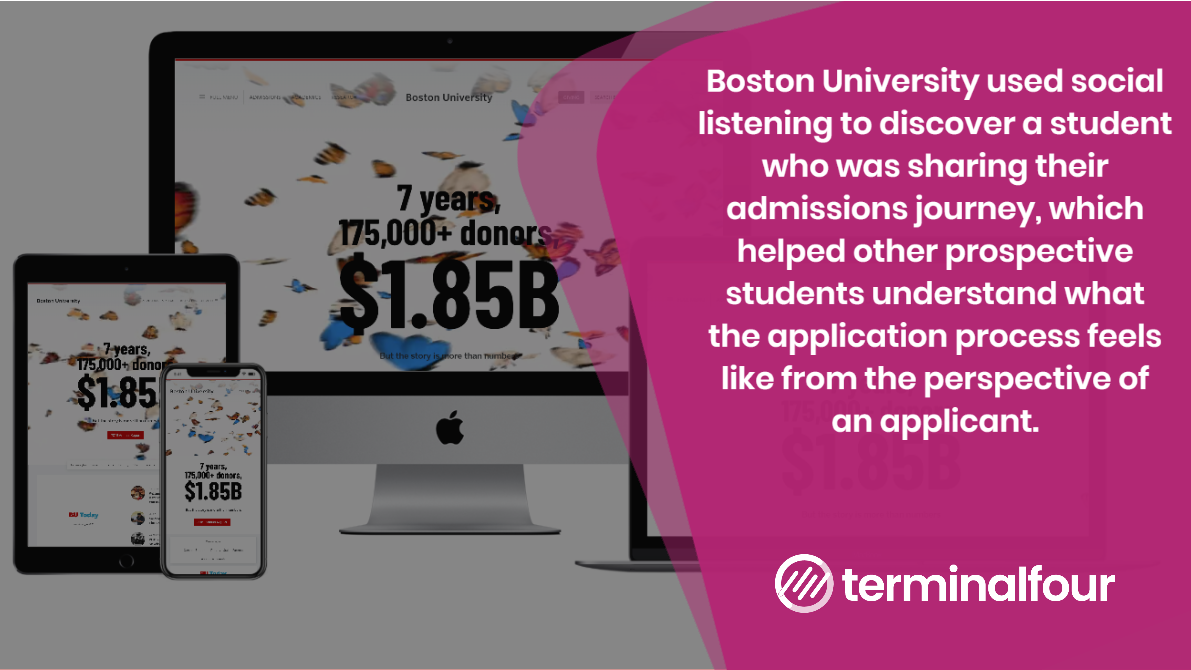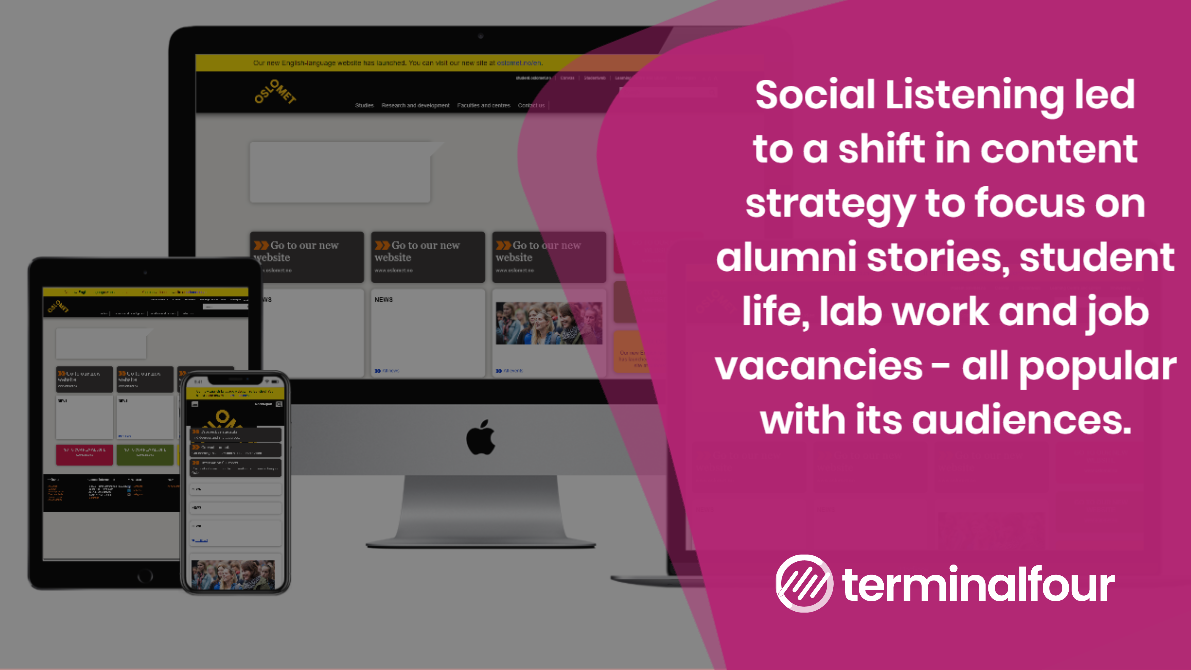While most university marketing teams are familiar with the daily routine of checking the institution's social networks to review mentions, comments, and direct messages, it's no longer enough to simply undertake social monitoring.
Instead, forward-thinking universities are now turning to social listening and conversational analysis.
Read on to find out how they are benefiting from these initiatives and using it to inform their strategy to engage audiences more effectively.
What is social listening?
Social listening is a process to track conversations around specific topics and keywords to gain insights into what your audience thinks about your institution.
It's comparable to social media monitoring but differs in terms of having an ongoing analysis of conversational data to gain deeper insights.
This powerful approach is helping universities to act quickly and respond to opportunities to engage more effectively with relevant audiences, and helping institutions to understand the sentiment relating to various topics to pinpoint valuable strategic changes.
Why does your marketing team need social listening and conversational analysis?
Social listening and conversational analysis put your marketing team on the front foot.
You can use it to identify influencers, notable alumni and prospective students and build a relationship with them. It will support you in detecting potential crises early and alerting relevant stakeholders quickly. And, of course, your team can use the insights to turn up the volume on user-generated content, in addition to the proactive social output from the institution. And through ongoing conversation and sentiment analysis, you can create an early warning system for issues and use the data to inform strategic decision making.
Boston University, for example, used social listening to discover a student who was sharing their admissions journey. By sharing this authentic content they've helped other prospective students understand what the application process feels like from the perspective of an applicant.

Meanwhile, Purdue University used social listening to identify donors on its annual Purdue Day of Giving. Their team was able to respond personally to everyone who mentioned them on social media or made a donation. This created high levels of donor engagement and excitement and increased the odds that people will donate again next year.
Social listening also provides a holistic view of your communications.
You can use it to shape your digital communications strategy by identifying trends, gaps in content, and opportunities to engage with different audiences. And it can support benchmarking activity, helping you to measure how your social media is performing against competitors in terms of sentiment and the quantity of engagement.
Oslo Metropolitan University, for example, was not experiencing much engagement from its social posts. Using social listening, the university was able to uncover which topics most interested its audience. This led to a shift in content strategy to focus on alumni stories, student life, lab work and job vacancies - all popular with its audiences.
The University of Chester in the UK had a strategy focused on English-speaking countries. However, through social listening, it discovered the institution was being mentioned frequently in South America, Spain, and Russia. This led to further research into future markets to explore. The institution also uses social listening to identify any negative trending topics they need to respond to, what criteria are driving application decisions and the overall sentiment for the university.

Enhancing marketing activity through social listening and conversational analysis
So, how else can institutions take advantage of this powerful technology?
- Identifying prospective students: by using social listening universities can segment out people who have expressed an interest in applying or, for example, if they have attended a campus tour.
- Mitigating crises: through social listening institutions can identify if a crisis has hit and respond rapidly based on good quality intelligence.
- Informing your paid advertising strategy: If you're running paid search and paid social campaigns, social listening can help to inform and optimize campaigns by identifying where people are posting institution-orientated content and the prominent topics.
- Competitor analysis: conversational analysis can give you unbiased visibility of where your institution stands compared to its peers on an ongoing basis. By tracking sentiment for your institution you can compare how your marketing efforts stack up against competitors.
Social listening and conversational analysis software options are increasing
Your institution will need a modern software solution to achieve anything beyond basic social listening.
The platform choice will largely be driven by your institution's budget, size and the expertise you have within your team to build queries, analyze and act on mentions.
The good news is that there are plenty of cloud-based solutions to choose from including SproutSocial, Hootsuite, Brandwatch, Talkwalker, and others, and new providers are entering the market.
On this point, a new and innovative platform, Wordnerds, is using AI to help universities to act on the millions of words of unstructured text written by their students, prospective students and employees inside and outside of their institution. Or put simply, they make words measurable.
Here are a few ways that WordNerds is being used by some universities in the UK.
- Trendspotting & market research - with Wordnerds institutions are monitoring the changing moods and trends and adjusting their marketing and recruitment accordingly.
- Real-time brand monitoring - Wordnerds is providing advanced warning on where to worry, taking the guesswork out of delivering what students want and giving them what they actually need.
- Analysis of online reviews/forums - Wordnerds is being used to pull out feedback earlier in the student journey to predict what students need and when by understanding the feelings of students in more depth.
And some savvy universities in the UK are now even using the platform to monitor personal statements.
The personal statement that each student submits is full of information on the student's interests, motivations, and values. Understanding these aspects of the student allows an institution to tailor their marketing more accurately, and give each student the information and the support that they need, potentially swaying the offer they accept.
It's conversation analysis taken to the next level!

Is this the year for universities to invest in social listening and conversational analysis technology?
There are thousands of people talking about your university on the web, and across social media at any one time.
Whilst you can't fully control the narrative, you can use conversations as a source of real-time intelligence and steer these in a natural way to best support your institution.
If this is new to your institution, now could be the time to bring stakeholders on board to put in place a social listening initiative. With it, you can analyze social at scale and connect more deeply with your audiences.

:format()//media/social-listening-blog.png)